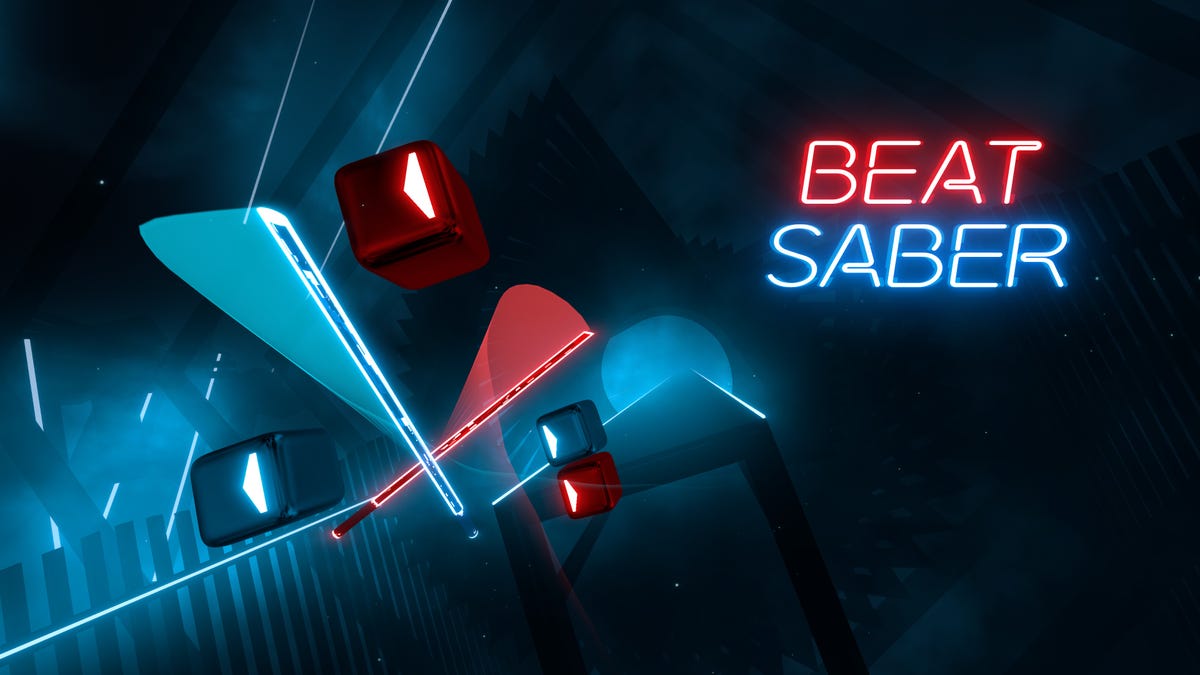Virtual reality gaming is a thing, but even so, you probably can’t name very many off the top of your head. And if you can, chances are the first one that pops into mind is Beat Saber—the One Good VR Game that any putz can enjoy without upchucking their lunch due to VR-induced motion sickness, or looking like a complete blowhard. So, you know, of course, Facebook was gonna put its grubby hands on it.
Well, as of today, Beat Saber now belongs to Facebook, which announced the acquisition in an Oculus blog. In an email, a Facebook spokesperson noted that “terms of the acquisition will not be disclosed.” That said, it would appear that the relatively lean Beat Games team will be joining Oculus Studios as an “independently operated studio” and its headquarters will remain in Prague.
If you’ve never played Beat Saber before, let me tell you, it’s delightful. As a glasses-wearer whose prone to motion-sickness, I’m not the biggest fan of VR. That said, I freaking love Beat Saber. If you’ve never played, it’s a mish-mash of Fruit Ninja and Guitar Hero, but instead of slashing fruit you’re rhythmically slicing through blocks with lightsabers. The 45 minutes I snuck away to play Beat Saber on some VR headset in the Gizmodo gadget closet remains one of my favorite memories of our new office. I was stressed, and playing through multiple levels to the sound of dope electronic beats was cathartic as hell.
So allow me to mourn this acquisition, even if the parties involved are probably happy about it. I mean yes, Facebook is probably pumping its fist because it just bought one of the most successful VR games out there—back in March, Beat Games announced it sold over one million copies just on the strength of word-of-mouth. Beat Games is also probably relieved, as it’s a tiny eight-person startup that has according to TechCrunch, eschewed venture capitalist funding.
But we’ve all seen this story play out before. Small Company With a Good Product gets bought by Big Company With Iffy Reputation. Promises are made, and promises are kept until the public forgets. New products aren’t as good as the old one, and often underdeliver on the grand promises made when the acquisition happened. It’s a narrative so tired and old, even Facebook had to acknowledge it in its blog’s Q&A section. From it’s announcement:
There’s a long history of indie studios joining larger companies and being ruined. How are you going to avoid that?
I’ve been in the industry for a while and have seen that firsthand. However, I’ve also seen and been a part of some incredible success stories. The story we aim to prove over time is this: An indie studio joins forces with some like-minded allies, and together they find a way to push VR to new heights.
I’ll believe it when I see it. For now, Facebook is promising that the upcoming 360° Levels mode will still ship in November and that more music options will be forthcoming. It also reassured us that, at least for now, the game will remain available on all non-Oculus platforms and that it wouldn’t slow down updates in a bid to prioritize Oculus customers. The company also addressed modding, which refers to players’ ability to create their own levels with songs that may not be officially licensed.
“We understand and appreciate the value that modding brings to Beat Saber when done so legally and within our policies. We’re going to do our best to preserve the value that mods bring to the Beat Saber player base” writes Mike Verdu, Oculus’s director of content, in the blog. “As a reminder, our most recent policy updates give more clarity to how developer mode is intended to be used, such as helping developers build their apps or for enthusiasts to explore new concepts. It is not intended for engaging in piracy or illicit modding, including mods that infringe on third-party IP rights or contain malicious code.”
That’s not surprising—Facebook’s a much bigger company and more liable to be on the hook for things like not paying royalties for music. But it is hard to take that response as a “Don’t worry, we’ll totally leave you guys alone. Keep on keeping on.”
Again, none of this news is super surprising. Facebook made its VR intentions clear when it bought Oculus in the first place—and buying the studio that makes a successful, popular game makes sense in the grand scheme of things. It’s just the sort of news that elicits a deep, shuddering sigh as you mentally move another product from the Good list to the Maybe Not As Good Next Year list.
[UploadVR]
